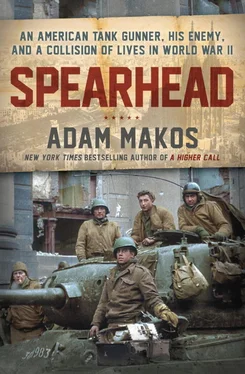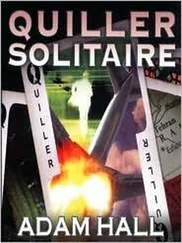Adam Makos
SPEARHEAD
AN AMERICAN TANK GUNNER, HIS ENEMY, AND A COLLISION OF LIVES IN WORLD WAR II
To those brave American tankers—the “power and might” of the New World—who went to the rescue of the Old
Some stories begin with a roll of the dice.
It was a Sunday morning in 2012 when I approached a brick row house in Allentown, Pennsylvania. The working-class neighborhood was quiet and no one paid me any notice.
I had come chasing a story.
My former college classmate Pete Semanoff had given me a lead on a World War II veteran living here in relative obscurity. Pete said this veteran had a tale to tell, maybe a book in the making. Supposedly, he had been a tank gunner in one of the war’s most legendary tank duels, and an army cameraman had filmed the whole thing.
But did he want to share his story? And would anyone want to read a book about tanks? This was before Brad Pitt strapped on his three-buckle boots for the filming of Fury, and before World of Tanks became all the rage.
And there was another question looming in my mind. The veteran had served in the 3rd Armored Division—the “Spearhead” Division. Most history buffs know of the Screaming Eagles. The Big Red One. Patton’s Third Army.
But the 3rd Armored Division?
The only 3rd Armored soldier I knew of had joined them during the Cold War. His name was Elvis.
—
I checked the house numbers against the address I had noted on my phone. This was the place.
I knocked, and Clarence Smoyer answered. He was eighty-eight and surprisingly tall, dressed in a simple blue polo shirt that stretched over a robust stomach. His thick glasses made his eyes seem small. Clarence welcomed me inside with a chuckle and pulled up a chair for me at his kitchen table. There, I’d make a discovery.
It was true. All of it.
This gentle giant held the keys to one of the last great untold stories of World War II, and he was ready to talk.
—
I’ve always visited the battlefields before I write about them. A Higher Call took me to a dusty airfield in Sicily. Devotion led my team and me into the misty mountains of North Korea.
To bring you the deepest level of historical detail for this book, we went to new lengths in our research. This time, we traversed the battlefields of the Third Reich— with the men who made history.
In 2013, Clarence Smoyer and three other veterans traveled to Germany and allowed us to tag along, to interview them on the ground where they had once fought. We recorded their stories. We recorded what they remembered saying and hearing others say. Then we verified their accounts with deep research.
We drew from four archives in America and one in England. We even traveled to the German Bundesarchiv in the Black Forest in search of answers. And what we found was staggering. Original orders. Rare interviews between our heroes and war reporters, conducted while the battle was raging. Radio logs of our tank commanders’ chatter, allowing us to time their actions to the minute. Daily weather reports. And much more.
Prepare to mount up.
In a few short pages you’ll find yourself behind enemy lines with the 3rd Armored Division, a “workhorse unit,” one of the “most aggressive” American divisions, and arguably the best in the armor business.
Even General Omar Bradley saw something special in Clarence and his comrades. When asked to gauge the personality of his units, Bradley wrote that Patton’s tankers adopted his “flair.” Simpson’s in the Ninth Army were known for their “breeziness.” And the 3rd Armored? They led the fighting march across Europe “with a serious and grim intensity.”
Serious. And grim. That’s who you’ll be riding with.
But this is not a story about machines, how one tank stacked up against another. This is a story about people.
We’ll drop you inside the tanks with Clarence and his fellow crew members, strangers from across America who became family.
We’ll lift you outside, into the elements and enemy fire, with an armored infantryman fighting to clear a path for the armor.
And we’ll explore the other side, stepping into the boots of a German tanker and into the shoes of two young fräuleins caught in the crossfire.
Ultimately, we’ll see what happens when these lives collide, leaving aftershocks that still shape the survivors more than half a century later.
Is the world ready for a book about tanks?
There’s one way to find out.
Shut the hatches.
Tighten your chin strap.
It’s time to roll out.
CHAPTER 1
THE GENTLE GIANT
September 2, 1944
Occupied Belgium, during World War II
Twilight fell on a country crossroads.
The only sounds came from insects buzzing in the surrounding blue fields, and something else. Metallic. The sound of hot engines ticking and pinging, decompressing after a long drive.
With silent efficiency, tank crewmen worked to rearm and refuel their tired Sherman tanks before the last hues of color fled the sky.
Crouched behind the turret of the leftmost tank, Corporal Clarence Smoyer carefully shuttled 75mm shells into the waiting hands of the loader inside. It was a delicate job—even the slightest clang could reveal their position to the enemy.
Clarence was twenty-one, tall and lean with a Roman nose and a sea of curly blond hair under a knit cap. His blue eyes were gentle, but guarded. Despite his height, he was not a fighter—he had never been in a fistfight. Back home in Pennsylvania he had hunted only once—for rabbit—and even that he did halfheartedly. Three weeks earlier he’d been promoted to gunner, second in command on the tank. It wasn’t a promotion he had wanted.
The platoon was in place. To Clarence’s right, four more olive-drab tanks were fanned out, “coiled,” in a half-moon formation with twenty yards between each vehicle. Farther to the north, beyond sight, was Mons, a city made lavish by the Industrial Revolution. A dirt road lay parallel to the tanks on the left, and it ran up through the darkening fields to a forested ridge, where the sun was setting behind the trees.

Clarence Smoyer
The Germans were out there, but how many there were and when they’d arrive, no one knew. It had been nearly three months since D-Day, and now Clarence and the men of the 3rd Armored Division were behind enemy lines.
All guns faced west.
Boasting 390 tanks at full strength, the division had dispersed every operational tank between the enemy and Mons, blocking every road junction they could reach.
Survival that night would hinge on teamwork. Clarence’s company headquarters had given his platoon, 2nd Platoon, a simple but important mission: guard the road, let nothing pass.
Clarence lowered himself through the commander’s hatch and into the turret, a tight fit for a six-foot man. He slipped to the right of the gun breech and into the gunner’s seat, leaning into his periscopic gun sight. As he had no hatch of his own, this five-inch-wide relay of glass prisms and a 3x telescopic gun sight mounted to the left of it would be his windows to the world.
Читать дальше













![Adam Turvi - Возвращение [СИ]](/books/422738/adam-turvi-vozvrachenie-si-thumb.webp)


